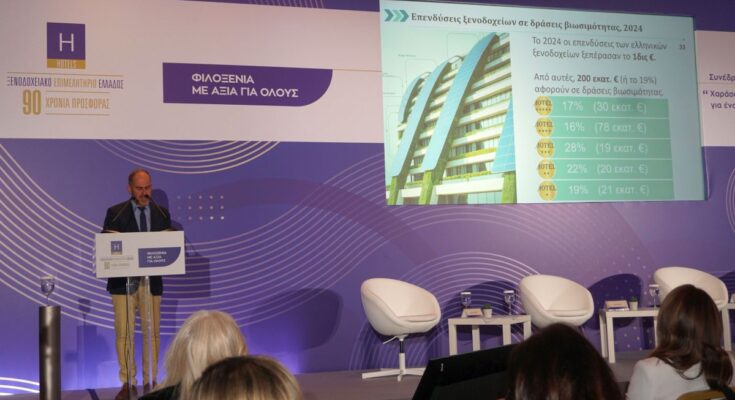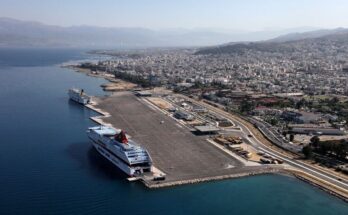
Dr. Georgios Petrakos, Professor at Panteion University and ITEP’s General Director, presenting the study. Photo © Greek Travel Pages (GTP)
One-fifth of 2024 hotel investments in Greece target sustainability initiatives, signaling a strategic shift in tourism’s future
Greek hotels are rapidly ramping up sustainability investments, with 200 million euros – or 19 percent – of all hotel investments in 2024 allocated to green initiatives, according to a new study by the Institute for Tourism Research and Forecasts (ITEP).
The report shows that total hotel investments in Greece surpassed 1 billion euros last year, with sustainability emerging as a key priority across all categories of accommodations.
The findings were presented during a major conference held on Rhodes by the Hellenic Chamber of Hotels (HCH) and the Region of South Aegean, entitled “Paving the Way for a Sustainable Tomorrow”. The event marked the 90th anniversary of the HCH’s presence in Greek hospitality.
“Commitment to sustainability requires responsibility in action,” said HCH President Alexandros Vassilikos. “This is why the hospitality industry is leading the way toward a sustainable tomorrow, confirming Greece’s leading role in global tourism. The goal is clear: sustainable hospitality means sustainable hotels and sustainable destinations.”

Hellenic Chamber of Hotels President Alexandros Vassilikos. Photo © Greek Travel Pages (GTP)
High-end hotels invest most, Smaller ones catch up
Of the 200 million euros invested in sustainability, the largest share came from high-end properties.
Five-star hotels invested approximately 30 million euros, while four-star hotels allocated about 78 million euros to upgrades such as energy-efficient infrastructure, water-saving systems, and waste management solutions. Lower-tier properties contributed around 20 million euros per category, generally focusing on cost-effective or highly visible improvements.
Dr. Georgios Petrakos, Professor at Panteion University and ITEP’s General Director, explained that “larger and more sophisticated hotels are adopting advanced technologies to measure and implement sustainability targets.” In contrast, smaller hotels tend to prioritize affordable, lower-tech solutions with immediate impact.
Where the investments went

Photo © Greek Travel Pages (GTP)
Sustainability investments spanned a wide range of initiatives, including:
– Energy-saving systems (e.g., insulation, HVAC upgrades)
– Smart heating and cooling controls
– Water-saving technologies such as low-flow fixtures
– Electric vehicle (EV) charging stations
– Recycling infrastructure for paper, plastic, and organic waste

Photo © Greek Travel Pages (GTP)
Notably, 15.7 percent of Greek hotels now offer EV charging – a threefold increase since 2020. Among five-star hotels, that figure rises to 65.3 percent, making what was once a niche amenity now a standard offering for environmentally conscious travelers.
Study identifies hotel sustainability profiles
The ITEP study offers a deeper look at how Greek hotels approach sustainability, identifying key behavioral profiles based on their energy and waste management practices.
For energy management, four categories emerged:

Photo © Greek Travel Pages (GTP)
– “Energy Profs” (8 percent): Primarily upscale hotels using advanced tools and analytics
– “Indifferent-Seasonal” (37 percent): Mostly small, one- to two-star, family-run properties relying on basic systems like solar water heaters
– “Versatiles” (32 percent): Mid-tier hotels leveraging a mix of solar energy and smart control systems
– “Micro-investors” (23 percent): Properties still using traditional fuels, with limited but targeted upgrades
For waste management, hotels were classified into six profiles:

Photo © Greek Travel Pages (GTP)
– “High Tech Recyclers” (9.4 percent): Early adopters with digital waste monitoring and food waste tracking
– “WM Experts” (9.3 percent): Larger, higher-end hotels with widespread waste management system implementation
– “Minimalists” (33.9 percent): Basic recycling practices only; no clear correlation by size or location
– “Non-engaged” (19.4 percent): Small, often family-run properties with virtually no formal waste policies
– “Balanced Performers” (12.6 percent): Strong in both recycling and reduction of material use
– “Cost Conscious” (15.4 percent): Focused on economical strategies, often lacking sustainability certifications
Water reduction and Business strategy

Photo © Greek Travel Pages (GTP)
The study also found that 60 percent of hotels now have water reduction targets. Nearly 46 percent have swimming pools, with more than 60 percent of those working to reduce leaks or using seawater. Towel reuse programs and reduced-flush toilets are now widely implemented.
While regulatory pressure and consumer expectations are clearly drivers, the report highlighted that hoteliers increasingly view sustainability as a strategic business imperative. EV chargers, for example, serve both as eco-friendly infrastructure and as competitive assets that attract premium, environmentally conscious guests.
What’s still needed: Tools, Cooperation, Vision

Hellenic Chamber of Hotels President Alexandros Vassilikos. Photo © Greek Travel Pages (GTP)
Despite the progress, Vassilikos stressed that the road to sustainable hospitality requires broader systemic support.
“We’ve made measurable progress,” he said, “but three ingredients are still essential: access to financial tools – especially for SMEs – coordinated cooperation, and a long-term vision.”
The “Paving the Way for a Sustainable Tomorrow” conference was the second held under the HCH’s “Hospitality with Value for All” initiative, commemorating its 90th year. The event’s central theme positioned tourism as a bridge between tradition and innovation, with sustainability as the guiding principle for the industry’s future.
Follow GTP Headlines on Google News to keep up to date with all the latest on tourism and travel in Greece.
Source link



